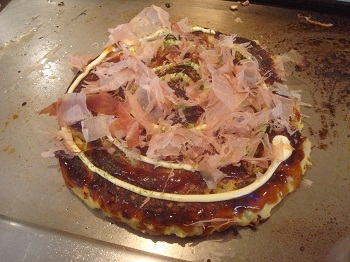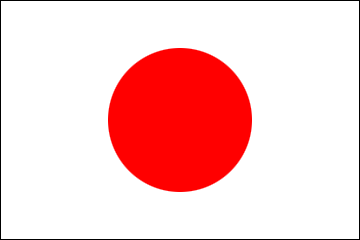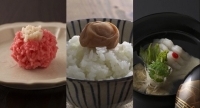Japanese Kitchen
Japanese food (Washoku) was accredited World Heritage status for its importance in the cultural heritage of humanity. Washoku is unique in that each region of Japan incorporates different specialties according to climate and topography, with the natural, geographical and seasonal influences visible in the ingredients used and the style of presentation.
In recognition of the World Heritage status, in 2014 we ran a series of articles introducing various regional dishes which could be cooked at home using ingredients available in the UK. Each article was written by a member of staff at the time, where they introduced a region of Japan as well as share a local recipe. There are many great recipes to do have a go at making some yourself!
Okonomi-yaki
by Kazuya Mori
originally published in January 2014My hometown Osaka has been dubbed the city of kuidaore, meaning “eat until you drop”. We are proud of what we eat and cook, and go the extra mile in this regard. When people in Japan are asked to name a dish that represents Osaka, the answer tends to be "okonomi-yaki". Like scones and pies in the UK, this dish is also served in various ways in many other parts of Japan. But in my opinion and with sincere apologies to those associated with other regions, Osaka is THE city of okonomi-yaki!
 Okonomi-yaki is a mixture of flour, eggs and diced cabbage garnished with meat, fish or vegetables and a savory sauce. Being round and flat, this dish is often known as “Japanese pizza or pancake”. As for the ingredients and toppings, there are numerous variations, best represented in the name okonomi-yaki itself, meaning “grilled as you like”.
Okonomi-yaki is a mixture of flour, eggs and diced cabbage garnished with meat, fish or vegetables and a savory sauce. Being round and flat, this dish is often known as “Japanese pizza or pancake”. As for the ingredients and toppings, there are numerous variations, best represented in the name okonomi-yaki itself, meaning “grilled as you like”.
Along with ramen and sushi, okonomi-yaki has become an inseparable part of Japanese fast food, and now within the country there exist thousands of specialized restaurants as well as street-food vendors active on festive days. In recent years, several okonomi-yaki restaurants have opened in London, so please look for them too.
Making okonomi-yaki is fun and simple, and it doesn’t take a three-star chef to do it. In fact, you can make the dish just by using ingredients from your local supermarket. There are various ways of preparing okonomi-yaki, and here is a typical recipe (for two servings) according to the Okonomi-yaki Association’s homepage.
Okonomi-yaki recipe
For the mixture
- flour 100g
- diced cabbage 200g
- unbeaten eggs 2
- water 150cc
- baking powder 3g
- pork belly (thin strips) 4 OR other ingredients such as shrimp or squid
For the sauce
(Items marked with an asterisk (*) can be found at Japanese grocery stores)
- okonomi-yaki sauce* (tonkatsu-sauce*) OR a mixture of Worcester sauce and ketchup with a hint of honey and soy sauce
- mayonnaise
- katsuo-bushi* (bonito flakes)
- aonori* (dry seaweed flakes)
Instructions
1) Mix the flour, water and baking powder well. Add chopped cabbage and mix well. Pour the eggs (unbeaten) and mix thoroughly.
2) Heat the pan to 200 degrees and add some oil. Then pour half of the mixture (from 1.) into the pan and gently make it flat. Place the pork strips on the top. In the case of smaller toppings like shrimp and squid, add them to the mixture instead.
3) After the mixture turns yellow and begins to harden, flip it over carefully (using two spatulas would make things easy). Gently flatten it.
4) Continue heating until the underside becomes brown. Then flip over again and continue heating to make the other side brown.
5) Take it out of the pan and place it on a plate. Brush the top with okonomi-yaki sauce. Add some mayonnaise. If available, sprinkle some bonito flakes and dry seaweed flakes. Pour some more okonomi-yaki sauce on the top to finish.
If you are lucky enough to come across some hard-to-find Japanese ingredients, adding a spoon of dashi (Japanese soup broth) and small portions of grated yamaimo (mountain potato) and tenkasu (lightly-fried tempura batter grains) to the mix will make the okonomi-yaki even more tender and tasty.
Whether you get hooked on making it or eating it, I hope you fully enjoy the fascinating world of okonomi-yaki. Perhaps one day you will visit my hometown, Osaka, to fully enjoy okonomi-yaki and other similar delicacies like takoyaki (known as 'octopus balls' in English). Osaka's food-loving culture and friendly good-humoured people await you!

